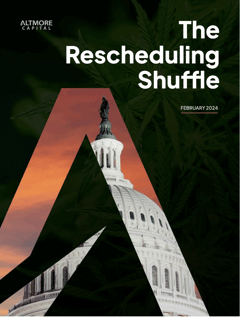The 2018 Farm Bill legalized the production and sale of hemp and hemp-derived products in the U.S....
Cannabis Conundrum: Strong Industry Prospects but Few Financing Sources
The Federal Reserve increased interest rates at the most rapid pace in four decades between 2022-23, and the repercussions have been far and wide.
For example, banks have retrenched amid liquidity constraints, regulatory scrutiny, and higher cost structures. Amid such conditions, demand for capital has outstripped supply, creating a void in the lending markets.
This has proven especially true in the cannabis industry.
Despite growth projections topping 10% a year for the next decade, new investment in the cannabis industry dwindled during 2023, falling to less than $2 billion—far from the nearly $7 billion raised in 2021.
Given the landscape, we believe private credit opportunities are compelling within this underserved—yet expanding—market. In this blog we examine how cannabis capital has a place in portfolios that are looking for alpha off the beaten path.
The Current State of the U.S. Cannabis Industry
We are fully cognizant of the pitfalls that happened as the cannabis sector first entered the mainstream. Early legalization efforts set off a frenzy of investment opportunities, many of which failed due to overhyped return expectations, weak business fundamentals, and dramatic volatility. Many early investors got burned. And many deemed the industry a nonstarter for investment possibilities.
Still Vibrant. And Compelling.
In fact, the legal cannabis industry grew to more than $30 billion in 2023 from $17.5 billion in 2020 for a compound annual growth rate of roughly 20%.
And it’s expected to grow at an 11.2% clip into the 2030s. Driven in large part by newer fully-legal markets such as Maryland, which allowed the purchase and possession of cannabis for personal adult use starting in July 2023, Ohio (November 2023), and Connecticut (July 2021).
Then there’s Missouri, where the first licensed sales of cannabis occurred in February 2023, and sales totaled more than $1.4 billion in sales in its first year. That approached the $1.6 billion in recreational sales in neighboring Illinois, which has twice the population and first legalized adult-use cannabis in January 2020.

Source: Globe Newswire; MJBizDaily; Altmore Capital Pitch Deck
Furthermore, turning to the first two states to legalize recreational cannabis, strong organic growth potential remains in existing markets. Specifically, Colorado has seen cannabis sales grow to more than $1.5 billion in 2023 from $683 million in 2014—its first year of legalization. Additionally, sales in Washington state are projected to hit $2.3 billion by 2026, up from about $357 million in the first 15 months it was legal starting in 2014.
Currently, adult use of recreational cannabis is legal in 24 states and Washington, DC. It’s medically legal in another 17 states, which means it may be prescribed to ease symptoms caused by certain medical conditions.
Given the fundamentals, industry analysts believe that over the next decade, cannabis could be one of the largest consumer categories in the Untied States.
With sales of more than $30 billion, it’s already topping the global music industry’s $28.6 billion in annual revenues. Other consumer thresholds of note include the $58 billion U.S. household appliances market, the $63 billion U.S. cosmetics market, and the $115 billion U.S. beer market.
And Yet, Cannabis Equity Investment Opportunities Waning
Early on, many people saw the cannabis industry’s potential for rapid growth and clamored to participate in equity investments in operators or purchased real estate tied to the industry.
And while the industry’s growth prospects were appealing, it was in its infancy and therefore very volatile. Early investment opportunities proved exceedingly complicated and frequently generated lackluster returns.
Even today, with growth prospects still promising, many of the traditional investments are in companies that struggle to generate profits, especially amid the occasional bouts of volatility that still arise. Equities and REITs in the cannabis space have underperformed and underwhelmed, leaving investors frustrated.
This has led to:
- Cannabis equity raises being down more than 60% year-over-year.
- Little-to-no institutional equity for U.S. cannabis.
- Only a handful of active cannabis VCs.
Traditional Avenues to Funding Limited
Access to capital has long been a challenge for the cannabis industry.
Unlike businesses in longstanding industries, which may secure bank loans to fund growth, operators in the cannabis space are served by few banks. And the ones that are willing to work with cannabis businesses tend to only lend against hard assets and the value of non-cannabis related real estate.
This primarily stems from the federal legal status of cannabis—the Controlled Substances Act of 1970 makes it illegal to engage in the manufacture, distribution, or sale of cannabis.
Most financial institutions, which are subject to federal law and insured by the Federal Deposit Insurance Corporation (FDIC), fear that they could be seen as engaging in criminal activity if they conduct business with a cannabis operator. Though there have been no reported instances of FDIC insurance being cancelled on a bank for its business lending choices, it remains a concern for many in the financial industry.
Which has left the cannabis industry searching for financing solutions.
This lack of access to traditional sources of capital, however, creates an opportunity for investors that understand the nuances of the industry and how to structure investments that limit downside risk, such as senior-secured, first-lien loans with strong covenant packages and amortizations.
A Private Credit Angle on Cannabis Finance
More broadly, private credit has ballooned into a $1.5 trillion industry. The combination of attractive returns, diversification, income generation, and risk mitigation make it a valuable component of an investor’s overall investment strategy.
For lenders, it provides a chance to invest in under-the-radar industries and businesses. For borrowers, it opens up access to capital they likely otherwise wouldn’t be able to obtain.
We believe the cannabis industry is perfectly poised to benefit from this symbiotic relationship.
Early on, though, equity financing dominated cannabis capital raises. Although private credit played an increasingly vital role in the industry, it wasn’t until 2022 when debt financing topped equity financing for the first time.

Source: MJBizDaily
Other factors that fueled the emergence of debt financing for cannabis capital included extreme volatility in publicly traded cannabis stocks and interest rates, as well as the maturation of the industry and the rise of some companies as creditworthy enterprises.
For those in private credit, this shift isn’t entirely surprising as cannabis debt levels held relatively steady compared to the boom-and-bust nature of cannabis equity. Looking ahead, debt financing is poised to remain a valuable option for raising capital as it offers operators more flexibility with less volatility than equity.
Our Unconventional Approach to Cannabis Capital
Here’s how we see the situation:
Cannabis is a large growth industry with a massive demand for capital with few financing options.
Our approach?
Apply proven methods of raising private capital for the cannabis industry such as:
- Bring a thoughtful, professional approach to the space
- Identify well-run, profitable, cash flowing businesses
- Devise deal structures that benefit investors and operators alike
Ultimately, in addition to guiding and educating investors about the cannabis space, we aim to be true financial partners to our borrowers. We target a winning solution for all parties involved, primarily through senior credit offerings. This path offers strong risk-adjusted returns while providing borrowers with terms that better align with their business needs.
Successful cannabis financing requires the same basic approach as any other private company financing, but due to challenging market and regulatory conditions, it requires stringent due diligence and an even greater focus on deal structure.
The opportunities for non-correlated returns in cannabis capital are intriguing, but we believe the optimal way to participate in the private credit opportunities are through a thoughtful, professional approach that fits an industry that’s maturing as clearly as it’s growing.



